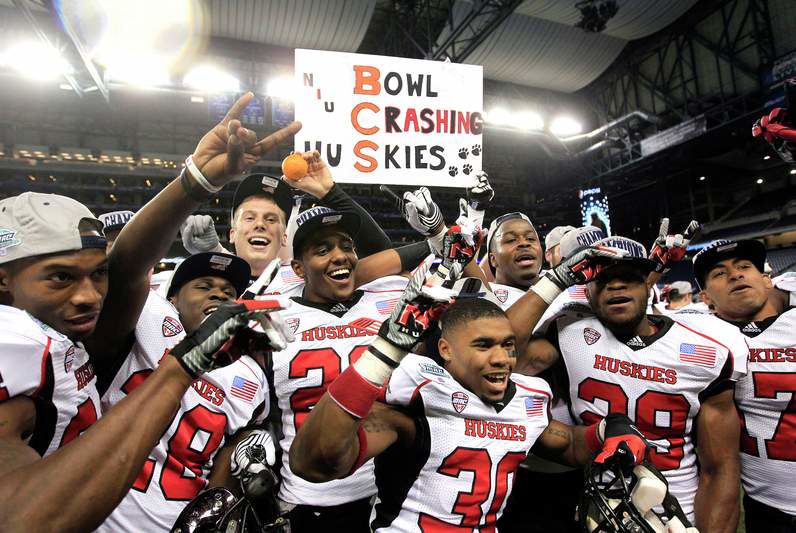How Northern Illinois joined BCS club
Published 4:00 am Friday, December 7, 2012

- Northern Illinois players celebrate after defeating Kent State 44-37 in double overtime in the Mid-American Conference championship game at Ford Field in Detroit last week. The Huskies, a mid-major school some 60 miles west of Chicago, are headed to the Orange Bowl.
DEKALB, Ill. — A few hours before Sunday night’s Bowl Championship Series selection show, Northern Illinois athletic director Jeff Compher sent an intern to buy 100 oranges at a nearby grocery store, then made sure they stayed hidden.
“I got the call, so I knew we were going to the Orange Bowl,” Compher said, “but I couldn’t tell anyone.”
Trending
Throughout the afternoon players monitored the news on Twitter, reading reports about their possible bowl game destinations. “I wanted to believe them, but I tried not to,” quarterback Jordan Lynch said.
When the official announcement came, the oranges were unveiled — and some quickly became projectiles.
That came after the euphoria on campus was tempered by the negative reaction from some college football pundits. ESPN’s Kirk Herbstreit called the inclusion of Northern Illinois in the Bowl Championship Series a “sad state for college football.” Lynch responded by hurling an orange at the television.
“I feel like we’re all Division I kids and we all deserve the same shot,” Lynch said. “If they don’t want to see us in there, then why give us a shot? Why come out with the rules that we can be in there?”
Northern Illinois is one of the most unlikely teams to reach a BCS game, and the first from the Mid-American Conference. The Huskies’ ascent, by virtue of a 12-1 season and the MAC championship, was aided by a series of BCS accounting quirks that kept out some traditional powers like Georgia, Louisiana State and Oklahoma — all ranked higher than Northern Illinois in the BCS standings.
That serendipity has seemed to follow the Huskies all season.
Trending
In his first year as a starter, Lynch set the Football Bowl Subdivision record for rushing yards by a quarterback with 1,771. Then came last weekend, when Northern Illinois won the MAC championship game against Kent State in double overtime Friday night, but found out Saturday that coach Dave Doeren was leaving to take over North Carolina State’s program.
The next day, Compher named Rod Carey as the new coach. Hours later came the official announcement that the Huskies were going to the Orange Bowl in Miami Gardens, Fla., where they will face Florida State on Jan. 1.
In Carey, Northern Illinois has a coach whose meteoric rise mirrors its own. Carey began the season as an assistant in charge of the offensive line. He was promoted to offensive coordinator after the first game when his predecessor, Mike Dunbar, left the team because he was battling cancer.
“I think it’s safe to say we’ve been riding a roller coaster,” Lynch said. “But right now, it’s the good kind of head spinning.”
The Huskies opened the season with an 18-17 loss to Iowa, one of two teams from a BCS conference on their schedule. They have won 12 straight since, behind an offense that averages 40.8 points, ninth best in the FBS.
Lynch, a junior, is the team’s catalyst. He drew limited interest from recruiters coming out of high school in Chicago, and his only scholarship offer to play quarterback came from Northern Illinois. Beyond his rushing yardage, he has scored 19 touchdowns on the ground and passed for another 24. In late October, Northern Illinois unveiled a Heisman campaign for him that included the slogan, “Jordan Lynch for 6.”
The Huskies own the nation’s longest home winning streak (21 games), have won 21 of their past 22 overall, and are headed to their seventh bowl game in nine seasons.
“Just about every one of these guys was told he wasn’t good enough, that he wasn’t wanted by one of the bigger schools,” Carey said. “That creates that chip, and they come here to work.”
The Northern Illinois campus here is an hour and a half west of downtown Chicago. The highway traces its way from skyscrapers to suburbia to farmland. A giant water tower with the Huskies’ logo overlooks the football stadium.
Northern Illinois, though, is not quite a complete outsider when it comes to big-time football. The program’s renaissance came under Joe Novak, who took over as coach in 1996. Novak endured a 23-game losing streak that spanned parts of his first three seasons but soon had NFL-level prospects like the future Atlanta Falcons running back Michael Turner coming to play for him.
“It took patience,” said Novak, who retired in 2007. “We focused on character guys who lived within five hours of us. You know, I never dreamt it would come to this.”
In 2007, the university unveiled the Yordon Center, a $14 million building that houses training equipment, a weight room, a tutoring center and the team’s locker room. A $9.5 million indoor practice facility is expected to open next year.
To Compher, a BCS game is not just about visibility or money. It also helps legitimize how the program was built.
“This proves we’ve done it right,” he said.
On Monday night, a single orange was lying on the Yordon Center parking lot, a remnant of the celebration tinged by national skepticism. Lynch was not sure what had become of the piece of fruit he tossed at the TV, but when asked what he might say to Herbstreit should he run into him, Lynch said: “I’m not worried about what I would say. I just want to play this game.”








